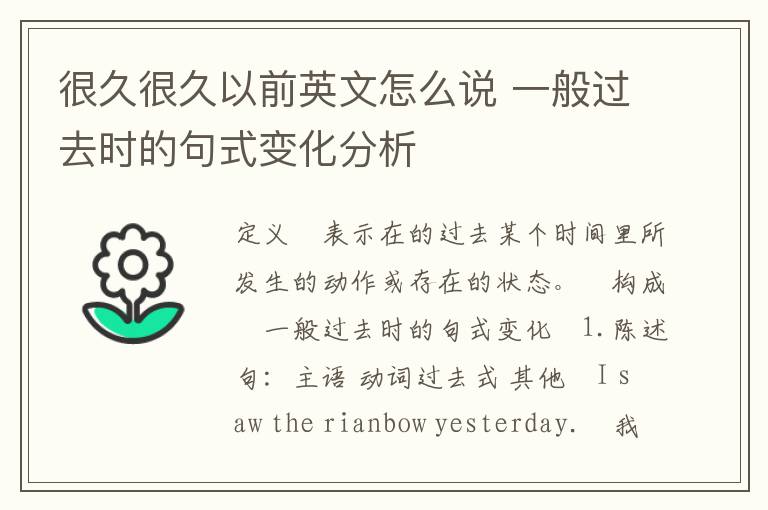
定义
表示在的过去某个时间里所发生的动作或存在的状态。
构成
一般过去时的句式变化
1.陈述句:主语 动词过去式 其他
I saw the rianbow yesterday.
我昨天看到了彩虹。
They went to he park last Sunday.
上周日他们去了公园。
Ben got up at six this morning.
本今天早上是六点起床的。
2.一般疑问句
1)将be动词提到句首
陈述句:It was an egg yesterday.
它昨天还是一个蛋。
一般疑问句 :Was it an egg yesterday?
它昨天还是一个蛋吗?
陈述句:They were at school just now.
他们刚才还在学校。
一般疑问句:Were they at school just now?
他们刚才还在学校吗?
Linda老师的小提醒
主语是第一人称和第二人称的句子,其过去时变化时,要注意be动词的变化。
一般疑问句:Were you at home last night?
你昨天晚上在家吗?
肯定回答:Yes,I was.
否定回答:No,I wasn‘t.
2)用助动词did
陈述句:I did my homework at school,
我在学校做了作业。
一般疑问句:Did you do your homework at school?
你在学校做作业了吗?
陈述句:They played basketball just now.
他们刚才打了篮球。
一般疑问句 :Did they play basketball just now?
他们刚才打篮球了吗?
小提醒
由过去时态的陈述句变一般疑问句时,变化技巧上可以用拆分法,将动词过去式拆分为did 动词原形,然后将did提到句首, 这样就不容易发生错误。
He slept a whole day.
他睡了一整天。
第一步:先将slept拆分为did sleep
第二步:将did提到句首
变成:Did he sleep a whole day?
他睡了一整天吗?
3.否定句
1)在be动词后面 not
陈述句:I was a teacher twenty years ago.
我20年前是一名老师。
否定句:I was not a teacher twenty years ago.
我20年前不是一名老师。
陈述句:We were in the shop before two o‘clock.
我们两点前在店里。
否定句:We were not in the shop before two o‘clock.
我们两点前不在店里。
小提醒
was not可以缩写成wasn‘t;were not可以缩写成weren‘t。
2)在动词前 didn‘t,动词变原形
陈述句:I did my homework at school.
我在学校做了作业。
否定句:I didn‘t do my homework at school.
我没有在学校做作业。
陈述句:They played basketball just now.
他们刚才打了篮球。
否定句:They didn‘t play basketball just now.
他们刚才没打篮球。
小提醒
由过去时态的陈述句变否定句时,同样可以用拆分法, 将动词过去式拆分为did 动词原形,然后在did后面 not,可缩写成 didn’t。
It dug a hole.
它挖了一个洞。
第一步:先将dug拆分为did dig;
第二步:在did后面 not,可缩写成didn’t
变成:It didn’t dig a hole.
它没有挖一个洞。
4.特殊疑问句(针对实义动词提问)
特殊疑问词 助动词did 主语 动词原形 其他?
1)针对动词提问
What did Mike do this morning?
迈克今天早晨做了什么?
What did you do yesterday?
你昨天做了什么?
2)针对地点提问
Where did they cook?
他们在哪里做了饭?
Where did he play badminton?
他是在哪里打羽毛球?
3)针对方式提问
How did they go to school?
他们是怎么去学校的?
How did he get to the zoo?
他是怎么到动物园的?
4)针对时间提问
When did he get up?
他是几点起床的?
What time did you have the first class?
你几点开始上第一节课?
5)针对动词的对象提问
What did she draw?
她画了什么?
What did he tell you?
他告诉了你什么?
小提醒
一般过去时态一般会与一些表示时间的词或短语连用。
yesterday…(昨天……):
yesterday morning 昨天早上;yesterday evening 昨天傍晚
last…(上一个……):
last night 昨夜;last Sunday 上周日 ;last month 上个月
…ago(……以前)
long long ago 很久很久以前; two months ago 两个月以前
before... (......之前)
before two hours 两个小时前
just now 刚才
一般过去时态也可用于过去一段时间内经常发生的动作或状态。可与often,usually,always等连用。
She often cooked dinner last summer holiday.
她去年暑假经常自己做晚餐。
如果是含有be动词的一般过去时陈述句,在变成特殊疑问句时,以特殊疑问词为开头,并替换画线部分,后面跟上原句的一般疑问句即可。
陈述句:He was in the classroom just now.
他刚才在教室里。
特殊疑问句:Where was he just now?
他刚才在哪儿?
陈述句:They were happy last Sunday.
他们上周日很开心。
特殊疑问句:How were they last Sunday?
他们上周日过得怎样?
标志词
yesterday 昨天 (yesterday 时间 last 时间)
ago 之前
before 在….之前
the day before yesterday 前天
just now 刚才
in 时间(in 1990)......
动词的一般过去时变化规律
⑴ 一般情况直接在词尾加 ed,
如:cook-cooked wash-washed
⑵ 以不发音的e 结尾的动词,在词尾 d
如:like-liked live-lived
⑶ 以重读闭音节结尾的动词,双写最后一个字母再在词尾 ed
如:stop-stopped shop-shopped plan-planned 计划
⑷ 以辅音字母 y 结尾的动词,要改y 为 i 再加 ed
如:study-studied carry- carried 运送,搬运
另外须记不规则动词的一般过去时变形。(附:不规则动词变化表)
1.改变动词中的元音:
begin→began drink→drank come→came
eat→ate grow→grew run→ran
know→knew win→won speak→spoke
take→took write→wrote get→got
2.变词尾的–d 为t:build→built lend→lent
send→sent spend→spent bend→bent
3.与动词原形一样:cut→cut put→put
cost→cost hurt→hurt shut→shut
4.变-ay 为-aid (少数动词):
say→said pay→paid lay→laid
5.采用不同词根:
sell→sold teach→taught buy→bought
6.其他。如:am/is→was
are→were have/has→had do→did
一般过去时的做题步骤:
⑴先找到句子中表示一般过去时的标志词。
⑵确定句子的动词是用be动词还是行为动词。
专项练习
一、写出下列动词的过去式
1.am/is _____ 2.do ____
3.go ________ 4.have _______
5.isn’t _________ 6. aren’t ________
7.spend________ 8.cook_______
9.read ________ 10.clean _______
11.live _____ 12.study_________
二、用括号内所给词的适当形式填空
1. We _________ (enjoy) ourselves at the party last night.
2.Jack ____________ (study) for the English test last Sunday.
3._______ you ______ (go) to the Great Wall last year?
4. What day _______ (be) it yesterday?
5.The old man _______(be)ill and went to see a doctor.
6.We ________ (have) a party last night.
7.We __________ (visit) the museum and went home.
8.— How _______ (be) the students? — They were very friendly.
9.He often _______ (have) supper at home. Today he ______ (have) supper at school.
10.— ______ he _______ (have) lunch at nine? — No, he didn’t.
11.They _________(buy) a guitar yesterday.
三、句型转换
1. He came here last month. (改为否定句)
He _______ _______ here last month.
2.They played football this morning. (改为一般疑问句并作简略回答)
—______ they _______ football this morning?
—Yes, they _______./No, they _________ .
3.They went to Beijing last year. (就划线部分提问)
_________ _________ they ________ last year.
4.Tom watched TV last night. (改为一般疑问句)
_______ Tom _______ TV last night?
5.Mary does homework every day. (用 last night 改写句子)
Mary ________ ____________ _________ ________ .
参考答案:
一、写出下列动词的过去式
1.was 2.did 3.went 4. had 5.wasn’t
6.weren’t 7.spent 8. cooked 9. read
10.cleaned 11.lived 12.studied
二、用括号内所给词的适当形式填空
1.enjoyed 2. studied 3.Did go
4.was 5. was 6.had 7.visited
8.were 9.has had 10.Did have
11.bought
三、句型转换
1.didn’t come 2.Did play did didn’t
3.Where did go 4. Did watch
5.did homework last night